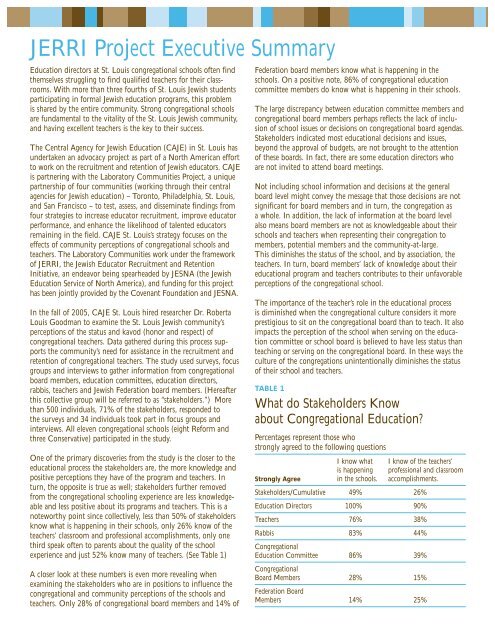Jewish Heroes Wanted: - Central Agency for Jewish Education
Jewish Heroes Wanted: - Central Agency for Jewish Education
Jewish Heroes Wanted: - Central Agency for Jewish Education
- No tags were found...
You also want an ePaper? Increase the reach of your titles
YUMPU automatically turns print PDFs into web optimized ePapers that Google loves.
JERRI Project Executive Summary<br />
<strong>Education</strong> directors at St. Louis congregational schools often find<br />
themselves struggling to find qualified teachers <strong>for</strong> their classrooms.<br />
With more than three fourths of St. Louis <strong>Jewish</strong> students<br />
participating in <strong>for</strong>mal <strong>Jewish</strong> education programs, this problem<br />
is shared by the entire community. Strong congregational schools<br />
are fundamental to the vitality of the St. Louis <strong>Jewish</strong> community,<br />
and having excellent teachers is the key to their success.<br />
The <strong>Central</strong> <strong>Agency</strong> <strong>for</strong> <strong>Jewish</strong> <strong>Education</strong> (CAJE) in St. Louis has<br />
undertaken an advocacy project as part of a North American ef<strong>for</strong>t<br />
to work on the recruitment and retention of <strong>Jewish</strong> educators. CAJE<br />
is partnering with the Laboratory Communities Project, a unique<br />
partnership of four communities (working through their central<br />
agencies <strong>for</strong> <strong>Jewish</strong> education) – Toronto, Philadelphia, St. Louis,<br />
and San Francisco – to test, assess, and disseminate findings from<br />
four strategies to increase educator recruitment, improve educator<br />
per<strong>for</strong>mance, and enhance the likelihood of talented educators<br />
remaining in the field. CAJE St. Louis’s strategy focuses on the<br />
effects of community perceptions of congregational schools and<br />
teachers. The Laboratory Communities work under the framework<br />
of JERRI, the <strong>Jewish</strong> Educator Recruitment and Retention<br />
Initiative, an endeavor being spearheaded by JESNA (the <strong>Jewish</strong><br />
<strong>Education</strong> Service of North America), and funding <strong>for</strong> this project<br />
has been jointly provided by the Covenant Foundation and JESNA.<br />
In the fall of 2005, CAJE St. Louis hired researcher Dr. Roberta<br />
Louis Goodman to examine the St. Louis <strong>Jewish</strong> community’s<br />
perceptions of the status and kavod (honor and respect) of<br />
congregational teachers. Data gathered during this process supports<br />
the community’s need <strong>for</strong> assistance in the recruitment and<br />
retention of congregational teachers. The study used surveys, focus<br />
groups and interviews to gather in<strong>for</strong>mation from congregational<br />
board members, education committees, education directors,<br />
rabbis, teachers and <strong>Jewish</strong> Federation board members. (Hereafter<br />
this collective group will be referred to as “stakeholders.”) More<br />
than 500 individuals, 71% of the stakeholders, responded to<br />
the surveys and 34 individuals took part in focus groups and<br />
interviews. All eleven congregational schools (eight Re<strong>for</strong>m and<br />
three Conservative) participated in the study.<br />
One of the primary discoveries from the study is the closer to the<br />
educational process the stakeholders are, the more knowledge and<br />
positive perceptions they have of the program and teachers. In<br />
turn, the opposite is true as well; stakeholders further removed<br />
from the congregational schooling experience are less knowledgeable<br />
and less positive about its programs and teachers. This is a<br />
noteworthy point since collectively, less than 50% of stakeholders<br />
know what is happening in their schools, only 26% know of the<br />
teachers’ classroom and professional accomplishments, only one<br />
third speak often to parents about the quality of the school<br />
experience and just 52% know many of teachers. (See Table 1)<br />
A closer look at these numbers is even more revealing when<br />
examining the stakeholders who are in positions to influence the<br />
congregational and community perceptions of the schools and<br />
teachers. Only 28% of congregational board members and 14% of<br />
Federation board members know what is happening in the<br />
schools. On a positive note, 86% of congregational education<br />
committee members do know what is happening in their schools.<br />
The large discrepancy between education committee members and<br />
congregational board members perhaps reflects the lack of inclusion<br />
of school issues or decisions on congregational board agendas.<br />
Stakeholders indicated most educational decisions and issues,<br />
beyond the approval of budgets, are not brought to the attention<br />
of these boards. In fact, there are some education directors who<br />
are not invited to attend board meetings.<br />
Not including school in<strong>for</strong>mation and decisions at the general<br />
board level might convey the message that those decisions are not<br />
significant <strong>for</strong> board members and in turn, the congregation as<br />
a whole. In addition, the lack of in<strong>for</strong>mation at the board level<br />
also means board members are not as knowledgeable about their<br />
schools and teachers when representing their congregation to<br />
members, potential members and the community-at-large.<br />
This diminishes the status of the school, and by association, the<br />
teachers. In turn, board members’ lack of knowledge about their<br />
educational program and teachers contributes to their unfavorable<br />
perceptions of the congregational school.<br />
The importance of the teacher’s role in the educational process<br />
is diminished when the congregational culture considers it more<br />
prestigious to sit on the congregational board than to teach. It also<br />
impacts the perception of the school when serving on the education<br />
committee or school board is believed to have less status than<br />
teaching or serving on the congregational board. In these ways the<br />
culture of the congregations unintentionally diminishes the status<br />
of their school and teachers.<br />
TABLE 1<br />
What do Stakeholders Know<br />
about Congregational <strong>Education</strong><br />
Percentages represent those who<br />
strongly agreed to the following questions<br />
I know what I know of the teachers’<br />
is happening professional and classroom<br />
Strongly Agree in the schools. accomplishments.<br />
Stakeholders/Cumulative 49% 26%<br />
<strong>Education</strong> Directors 100% 90%<br />
Teachers 76% 38%<br />
Rabbis 83% 44%<br />
Congregational<br />
<strong>Education</strong> Committee 86% 39%<br />
Congregational<br />
Board Members 28% 15%<br />
Federation Board<br />
Members 14% 25%

















